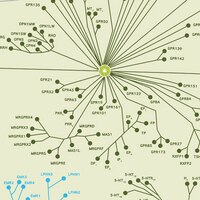HTS099M Sigma-AldrichChemiSCREEN™ Membrane Preparation Recombinant Human EP1 Prostanoid Receptor
Human EP1 GPCR membrane preparation for Radioligand binding Assays & GTPγS binding.
More>> Human EP1 GPCR membrane preparation for Radioligand binding Assays & GTPγS binding. Less<<Recommended Products
Overview
| Replacement Information |
|---|
Key Spec Table
| Species | Host Cells | Protein Target |
|---|---|---|
| Human | Chem-1 | EP1 |
| References |
|---|
| Product Information | |
|---|---|
| Format | Membranes |
| Presentation | Liquid in packaging buffer: 50 mM Tris pH 7.4, 10% glycerol and 1% BSA with no preservatives. Packaging method: Membrane protein was adjusted to the indicated concentration in packaging buffer, rapidly frozen, and stored at -80°C. |
| Quality Level | MQ100 |
| Physicochemical Information |
|---|
| Dimensions |
|---|
| Materials Information |
|---|
| Toxicological Information |
|---|
| Safety Information according to GHS |
|---|
| Safety Information |
|---|
| Storage and Shipping Information | |
|---|---|
| Storage Conditions | Store at –70°C. Product is stable for at least 6 months from the date of receipt when stored as directed. Do not freeze and thaw. |
| Packaging Information | |
|---|---|
| Material Size | 200 units |
| Transport Information |
|---|
| Supplemental Information |
|---|
| Specifications |
|---|
| Global Trade Item Number | |
|---|---|
| Catalogue Number | GTIN |
| HTS099M | 04053252588686 |
Documentation
ChemiSCREEN™ Membrane Preparation Recombinant Human EP1 Prostanoid Receptor SDS
| Title |
|---|
ChemiSCREEN™ Membrane Preparation Recombinant Human EP1 Prostanoid Receptor Certificates of Analysis
| Title | Lot Number |
|---|---|
| CHEMISCREENTM MEMBRANE PREPARATION RECOMBINANT HUMAN EP1 PROSTANOID RECEPTOR - 2121324 | 2121324 |
| CHEMISCREENTM MEMBRANE PREPARATION RECOMBINANT HUMAN EP1 PROSTANOID RECEPTOR - | |
| CHEMISCREENTM MEMBRANE PREPARATION RECOMBINANT HUMAN EP1 PROSTANOID RECEPTOR - 2188018 | 2188018 |
Data Sheet
| Title |
|---|
| CHEMISCREENTM MEMBRANE PREPARATION RECOMBINANT HUMAN EP1 PROSTANOID RECEPTOR |














